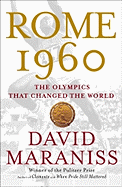
With the XXIX Olympiad in Beijing almost upon us, it's the perfect time to look back on the dramatic summer games of 1960, a time both simpler and more complex than our own. In the capable hands of Pulitzer Prize-winning author David Maraniss, it's a stimulating trip, blending spellbinding accounts of sporting victories and defeats, Cold War political intrigue and affecting portraits of key participants, both famous and obscure.
While the Rome Olympics may not have "changed the world," there's no doubt strong currents of change rippled through these games, among them pressure to redefine the nature of amateurism, increasing tension between the growing prominence of African-American athletes and the blatant racial discrimination they faced at home, even the first stirrings of concern over athletes' resort to performance-enhancing drugs. All of this is played out against the backdrop of the ideological conflict between the United States and the Soviet Union, as their struggle hovered on the brink of perhaps its most dangerous phase.
Maraniss paints sharp and memorable portraits of many athletes, minus the maudlin human interest spin that's become a mainstay of recent television coverage: the brilliant decathelete Rafer Johnson; the electrifying sprinter Wilma Rudolph; Cassius Clay before he became Muhammad Ali; and lesser-known names like James Bradford, the American weightlifter who took leave without pay from his $56-a-week job at the Library of Congress to compete, or David Sime, the sprinter recruited in a bungled scheme to encourage Soviet long jumper Igor Ter-Ovanesyan to defect.
Although he's written acclaimed biographies of Vince Lombardi and Roberto Clemente, Maraniss isn't a sportswriter by trade. Despite that, his accounts of the competitions are crisply narrated, drawing effectively on first-person reports from legendary writers like Red Smith and A.J. Liebling. He's equally skilled in exposing the hypocrisy of the Olympic "movement"--personified in the chair of the IOC, Avery Brundage--imposing draconian definitions of amateurism while lavishing expensive perks upon its leadership.
When one considers the more than $2 billion NBC paid to provide almost nonstop coverage of the Beijing games and the 2010 Winter Olympics, it seems quaint that in 1960 CBS News paid $600,000 to air 20 hours of taped highlights narrated by the late Jim McKay, whose career became identified with this international competition. It's a long path from what now feel like the almost pastoral days of 1960 to the bloated spectacle into which the modern Olympics have grown. Maraniss's engaging narrative is an expertly told tale of what was and what never will be again.--
Harvey Freedenberg
Shelf Talker: An engaging account of the dramatic summer games of 1960, with spellbinding accounts of sporting victories and defeats, Cold War political intrigue, IOC hypocrisy and affecting portraits of key participants.









 With the XXIX Olympiad in Beijing almost upon us, it's the perfect time to look back on the dramatic summer games of 1960, a time both simpler and more complex than our own. In the capable hands of Pulitzer Prize-winning author David Maraniss, it's a stimulating trip, blending spellbinding accounts of sporting victories and defeats, Cold War political intrigue and affecting portraits of key participants, both famous and obscure.
With the XXIX Olympiad in Beijing almost upon us, it's the perfect time to look back on the dramatic summer games of 1960, a time both simpler and more complex than our own. In the capable hands of Pulitzer Prize-winning author David Maraniss, it's a stimulating trip, blending spellbinding accounts of sporting victories and defeats, Cold War political intrigue and affecting portraits of key participants, both famous and obscure.